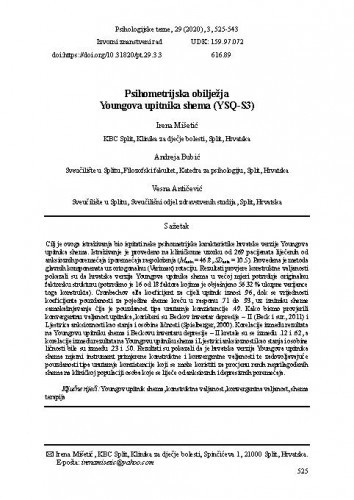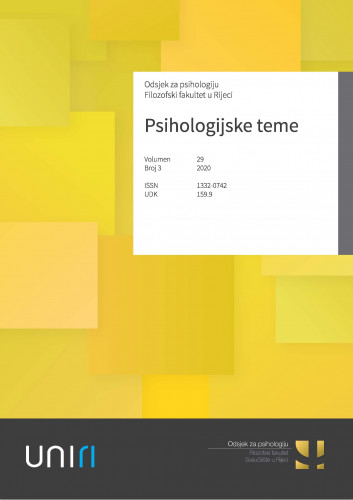Cilj je ovoga istraživanja bio ispitati neke psihometrijske karakteristike hrvatske verzije Youngova upitnika shema. Istraživanje je provedeno na kliničkome uzorku od 269 pacijenata liječenih od anksioznih poremećaja i poremećaja raspoloženja (Mdobi = 46.8, SDdobi = 10.5). Provedena je metoda glavnih komponenata uz ortogonalnu (Varimax) rotaciju. Rezultati provjere konstruktne valjanosti pokazali su da hrvatska verzija Youngova upitnika shema u većoj mjeri potvrđuje originalnu faktorsku strukturu (potvrđeno je 16 od 18 faktora kojima je objašnjeno 56.32 % ukupne varijance toga konstrukta). Cronbachov alfa koeficijent za cijeli upitnik iznosi .96, dok se vrijednosti koeficijenta pouzdanosti za pojedine sheme kreću u rasponu .71 do .93, uz iznimku sheme samokažnjavanje čija je pouzdanost tipa unutarnje konzistencije .49. Kako bismo provjerili konvergentnu valjanost upitnika, korišteni su Beckov inventar depresije – II (Beck i sur., 2011) i Ljestvica anksioznosti kao stanja i osobine ličnosti (Spielberger, 2000). Korelacije između rezultata na Youngovu upitniku shema i Beckovu inventaru depresije – II kretale su se između .12 i .62, a korelacije između rezultata na Youngovu upitniku shema i Ljestvici anksioznosti kao stanja i osobine ličnosti bile su između .23 i .50. Rezultati su pokazali da je hrvatska verzija Youngova upitnika shema mjerni instrument primjerene konstruktne i konvergentne valjanosti te zadovoljavajuće pouzdanosti tipa unutarnje konzistencije koji se može koristiti za procjenu ranih neprilagođenih shema na kliničkoj populaciji osoba koje se liječe od anksioznih i depresivnih poremećaja.; This study aimed to examine some of the psychometric characteristics of the Croatian version of the Young Schema Questionnaire to verify its construct validity and to compare these results with results of research in different populations. The study was conducted on a clinical sample consisting of 269 patients treated for anxiety disorders and mood disorders (Mage = 46.8, SDage = 10.5). Principal component analysis with orthogonal (Varimax) rotation was conducted. The results of examining construct validity showed that the Croatian version of Young's scheme questionnaire largely confirms the original factor structure (16 of the 18 factors that explain 56.32 % of the total variance of this construct). The Cronbach's alpha coefficient for the whole questionnaire is .96, while the reliability for the individual schemas range from .71 to .93 (the exception is the selfpunishment scheme whose internal consistency reliability is .49). To investigate the convergent validity of the questionnaire, we used Beck's Depression Inventory - II (Beck et al., 2011) and Anxiety Scale as state and trait (Spielberger, 2000). Correlations between scores on the Young Scheme Questionnaire and Beck’s Depression Inventory - II were between .12 and .62, and correlations between the scores on the Young Scheme Questionnaire and the Anxiety Scale as state and trait were between .23 and .50. The results showed that the Croatian version of the Young Schema Questionnaire is a measurement instrument with good construct and convergent validity as well as satisfactory internal consistency reliability, that can be used to measure early maladaptive schemas in the clinical population of people being treated for anxiety and depression.
Sažetak

 Psihologijske teme : 29,3(2020) / glavna i odgovorna urednica Barbara Kalebić Maglica.
Psihologijske teme : 29,3(2020) / glavna i odgovorna urednica Barbara Kalebić Maglica.